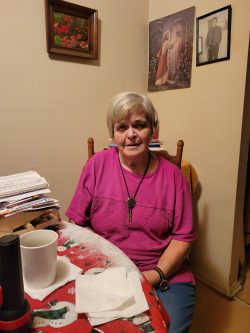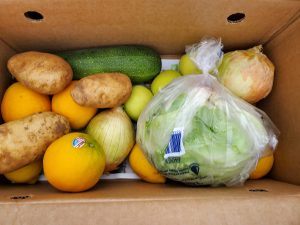
Linda is 72 years old. She doesn’t work anymore, and she takes care of her 54-year-old son who lives with her and is fully disabled. He has special dietary needs and needs around-the-clock care.
Even before the pandemic, money was always tight. Linda lives on her Social Security; her son receives Disability. She also receives Medicare, and he receives Medicaid. But it didn’t cover all the cost of her prescriptions. They also received Supplemental Nutrition Assistance (SNAP). This is also known as food stamps, but it was only about $50.00 a month. Since Linda is a senior and her son is disabled they must meet the 100% of poverty guidelines standard for the income requirements to receive SNAP, which means they cannot make more than $1,437 a month after allowed deductions.
And, even with the help, the smallest issue could cause her to run low on funds. By the end of the month she would have to borrow money from relatives or friends for food. This could become a vicious cycle. Borrow money, pay it back on the first when she got her Social Security. Then by the end of the next month, she would be short again. When things were especially tight, she would make sure her son had what he needed and she would go without.
When the pandemic first started, it was very hard for Linda to know what was really going on. The information was changing so fast, it was very confusing. The home healthcare nurses that came to help her son a few days a week limited their hours and contact because of COVID-19. Linda was also helping to care for her elderly cousin who lived in the same apartment complex and who was ill and eventually was diagnosed with brain cancer. She passed away in 2021, which was especially hard on Linda.
It was hard to find things she needed to keep them safe because everything was sold out in the store. She worried what would happen if she got sick with COVID because she didn’t have anyone else to take care of her son. Finally, Linda had to limit her contact outside her home. She went to the bank, to pay her insurance, and to church and that was it. She couldn’t even go to see family for fear of getting sick.
It took her weeks to be able to buy a mask for herself and her son. Even longer to get hand sanitizer and gloves. Prices for normal things were also going up. Linda didn’t have extra money in her budget, so it put her even more in a bind. Linda was struggling and didn’t know what to do. There was not any help available, and government offices were closed so she couldn’t get any information.
Once she paid their rent and her car insurance, she barely had anything left for food. Her insurance agent was part of the Working Together in the Community group (WTITC) that worked to help improve communities in Little Rock. When she learned of Linda’s plight, she not only helped her get assistance to pay her insurance but made sure that WTITC added Linda and her cousin to their weekly Farmers to Families fresh food box distribution. Since Linda had to be home to care for her son and couldn’t wait in the long lines for the distribution, volunteers were able to deliver the fresh food boxes to her home each week.

“It was a blessing,” Linda said. “We got these really big boxes with healthy and good food in them. I didn’t have to spend as much at the grocery store and I could depend on them. I didn’t have to worry that they would forget me.” Not only that, but she appreciated how the volunteers cared about her and her family. They would check in when they delivered the food and helped her with masks and information. “They have a heart to care for others. My mother always told me it is important to take care of yourself but to remember that if you can you help others as much as possible. They have that heart to help people.”
Unfortunately, the program ended in December 2020. Linda can’t believe how high food prices are now. It is hard to buy nutritious foods because everything is so expensive. And she’s back to being without help.
Through all this, the pandemic has made everything harder. Linda says she has anxiety and worries constantly about what might happen. She can’t leave her home without worrying that she might catch COVID. She was happy that she and her son were able to get their vaccines this summer. They were eligible to receive the vaccine in March. But Linda had a hard time finding information about how to make an appointment because she doesn’t have internet access, even on her phone.
Linda had to renew her food stamps this month. That meant she had to collect proof from Social Security of her and her son’s payments because they wouldn’t accept the letter that was sent in January detailing benefits for the year. She had to get one year of banks statements for each of them, proof of the other benefits they receive, proof of her rent payments, and other documents. It’s taken her weeks to try to collect all the things they need even though nothing has changed since last year.
It should be easier, Linda thinks. These programs are all from the government. They should be able to collect that information without her. Why can’t SNAP get the information directly from Medicaid and Social Security? Then she could worry about only the things like rent payments and bank statements. “The government forgets about us older folks,” Linda said. “We need help. We need people to check on us and to help us through these processes. I have to take care of everything for me and my son. Food is so expensive now and what we get is not enough to buy regular meals. They should consider that and think about how these price changes make us struggle even harder.”
